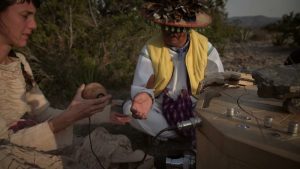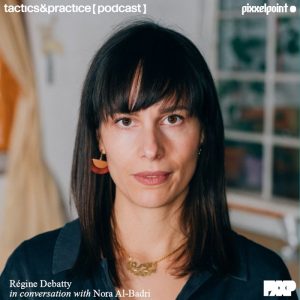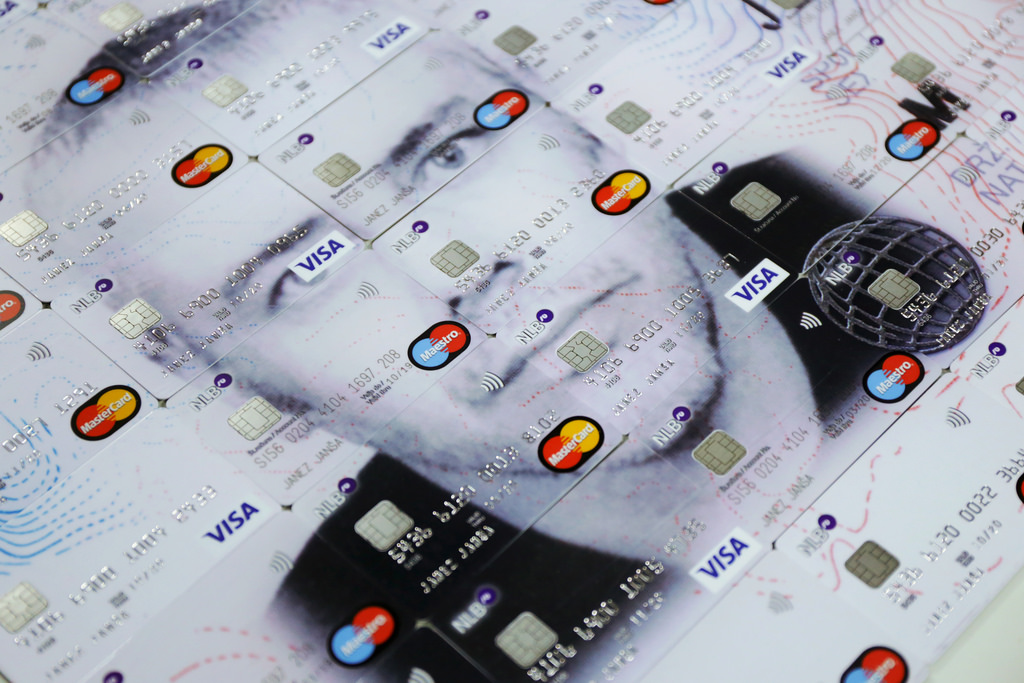
Janez Janša, Janez Janša and Janez Janša, All About You (detail), 2016. Photo: Katra Petriček
Janez Janša, Janez Janša and Janez Janša, All About You (stop motion video), 2016
Since 2012, the three Slovenian artists Janez Janša, Janez Janša and Janez Janša have been exploring concepts related art, identity and finance and how these 3 spheres can connect -quite intimately and literally- on a very mundane piece of plastic most of us carry in our pocket: the credit card. At the time, their ideas might have looked quite far-fetched and speculative. Printing their artworks on credit cards, for example. Or signing with their names the credit cards of other people. In 2013 however, scenarios that the artists were foreseeing seemed to materialize when the United Bank for Africa launched the “All About U” Debit MasterCard, a personalized debit card which can be customized to their customers’ whim. Mastercard and the Nigerian government pushed the experiment even further by introducing the MasterCard-branded National Identity Smart Card, an ID card that comes with electronic payment capability, demographic data as well as biometric data.
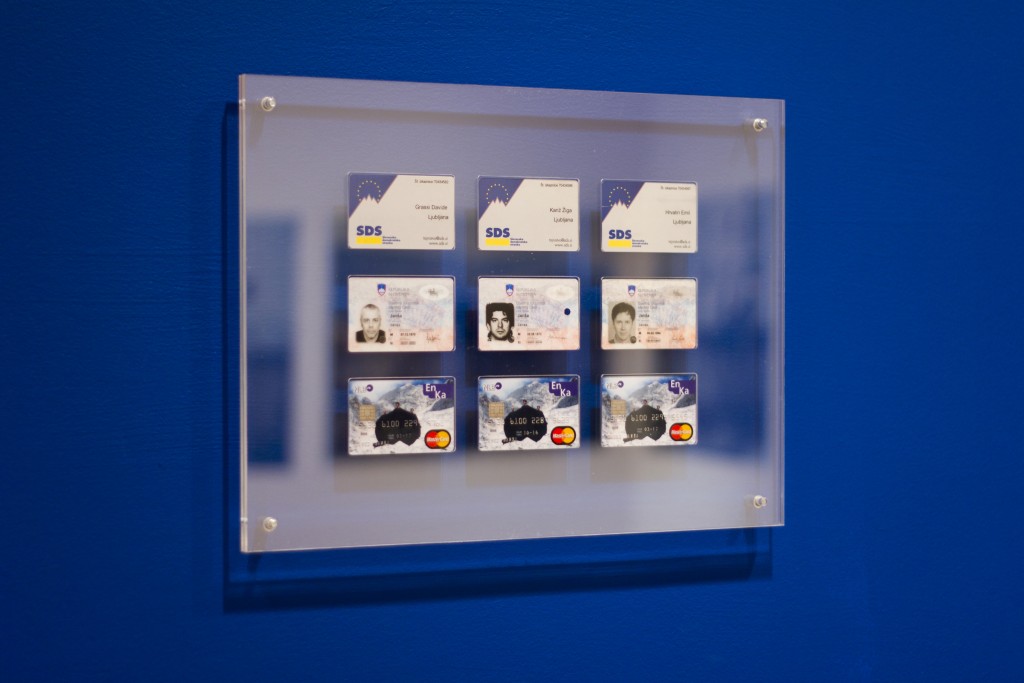
anez Janša, Janez Janša, Janez Janša, Troika (installation detail), 2013

Janez Janša, Janez Janša and Janez Janša, Signatures on Maestro / Triptych / part of CREDITS series
Last year, the Janez Janša collective decided to take advantage of the personalized card service offered by their own bank in Slovenia. Each of the artist magnified the image of his ID card, and divided it into a hundred parts of equal sizes. After that, they individually applied for a new personalized Visa®, Maestro® and MasterCard® every week in the hope that each of them would gradually be able to compose a self portrait made of one hundred customized bank cards.
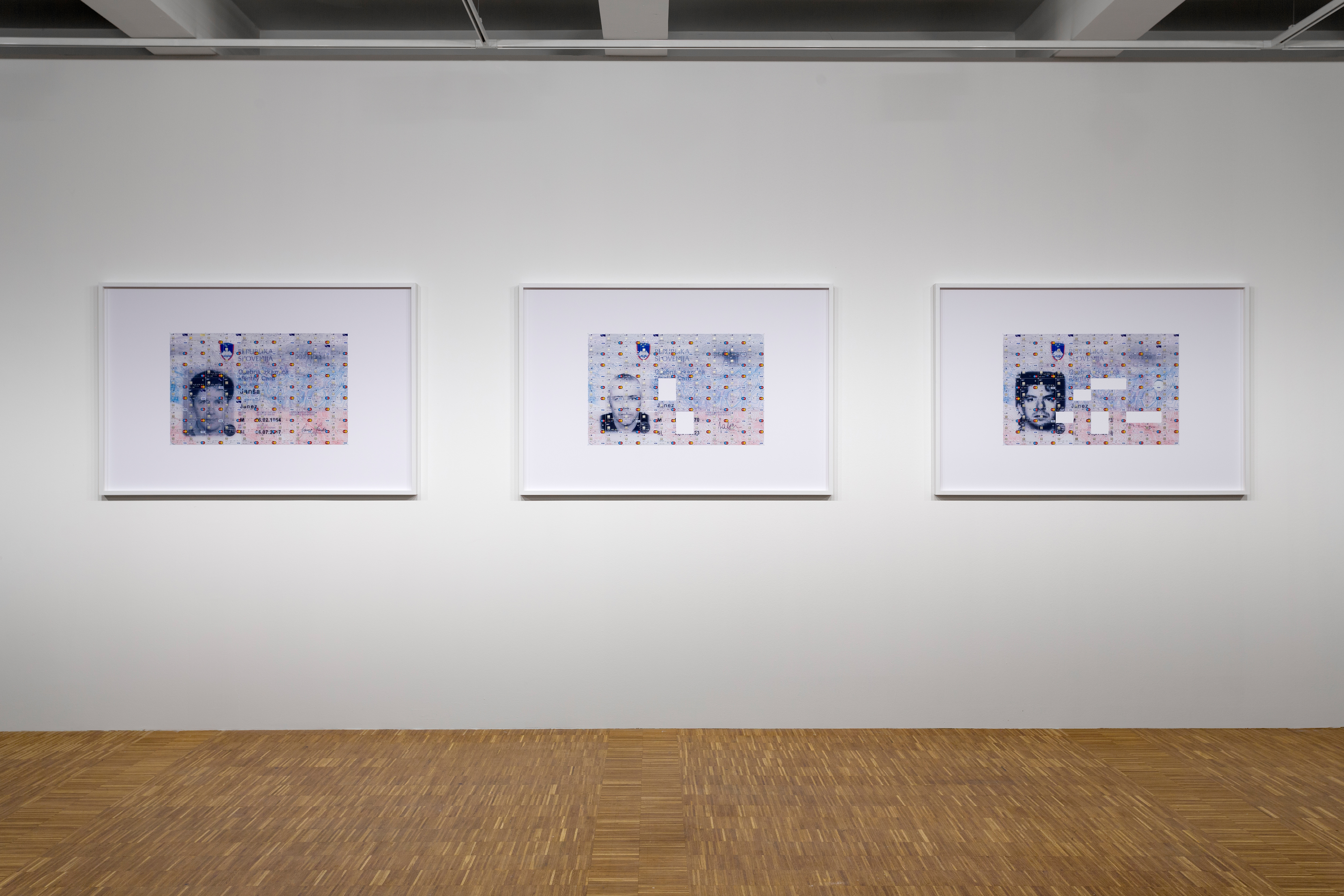
Janez Janša, Janez Janša and Janez Janša, All About You (exhibition view), 2016. Photo: Andrej Peunik
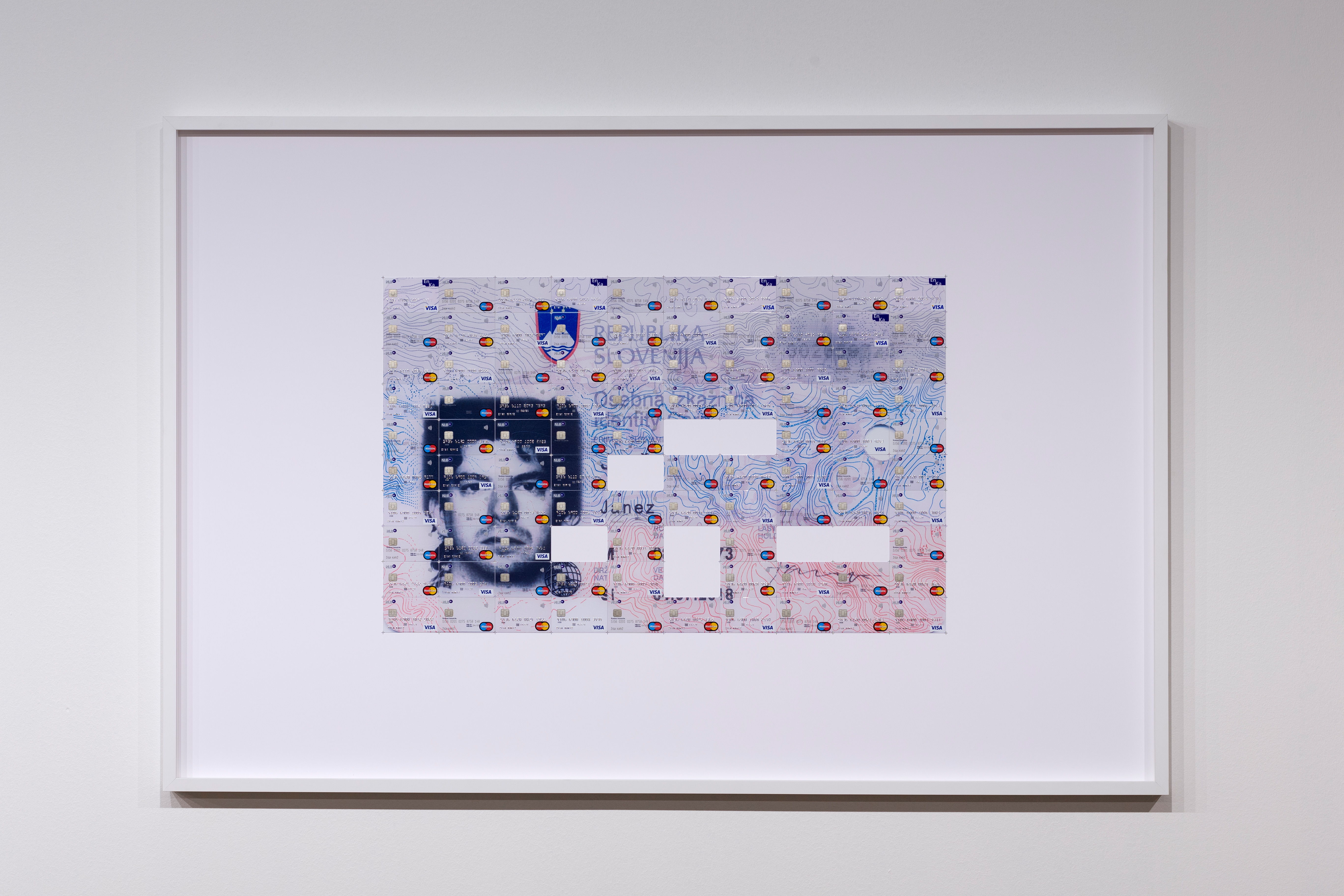
Janez Janša, Janez Janša and Janez Janša, All About You (exhibition view), 2016. Photo: Andrej Peunik
The result is a triptych of puzzles. Two of them incomplete, the blanks corresponding to decisions by bank employees to reject the design for a particular card that one of the artists had sent. Each request for a new bank card was indeed subjected to the approval of bank employees who could accept or deny the image on the basis of the bank’s image guidelines: no word in foreign language, no state symbol, no olympic sign, etc. Each time an image was rejected, the artist attempted to establish a dialogue with the bank, asking the employees to reconsider their decision. Sometimes the artists managed to make them changed their mind. Sometimes they didn’t.
This turned the production into a time-based relational performance where the relation between the artist and the producer coincided with the relation between the bank’s customer and his bank.
The triptych All About You raises issues related to art: new forms of ready-made in the age of mass customization, delegation of the manufacturing of art to others (while Koons, Hirst and Murakami have a team of artists/artisans to paint and sculpt for them, Janez Janša used their bank as some kind of printing facility), etc. The work also deals with money circulation, ownership, identification and citizenship, data collection by private entities, etc. In fact, there is so much to say about the work that i thought it would be better to let the artists say it themselves. So i interviewed them:
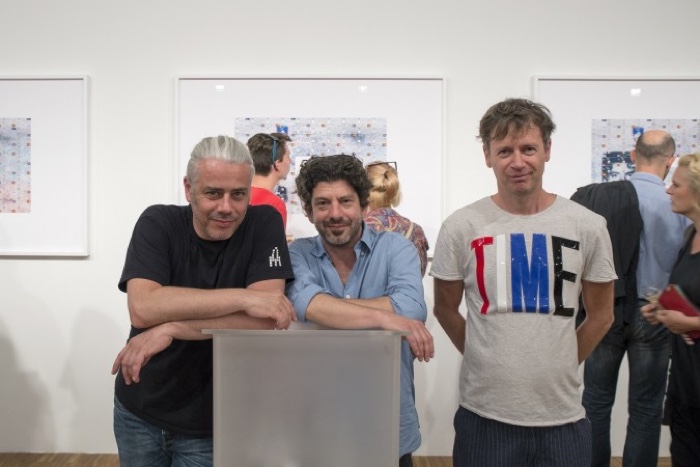
Janez Janša, Janez Janša and Janez Janša, All About You, 2016. Photo: Katra Petriček/Aksioma
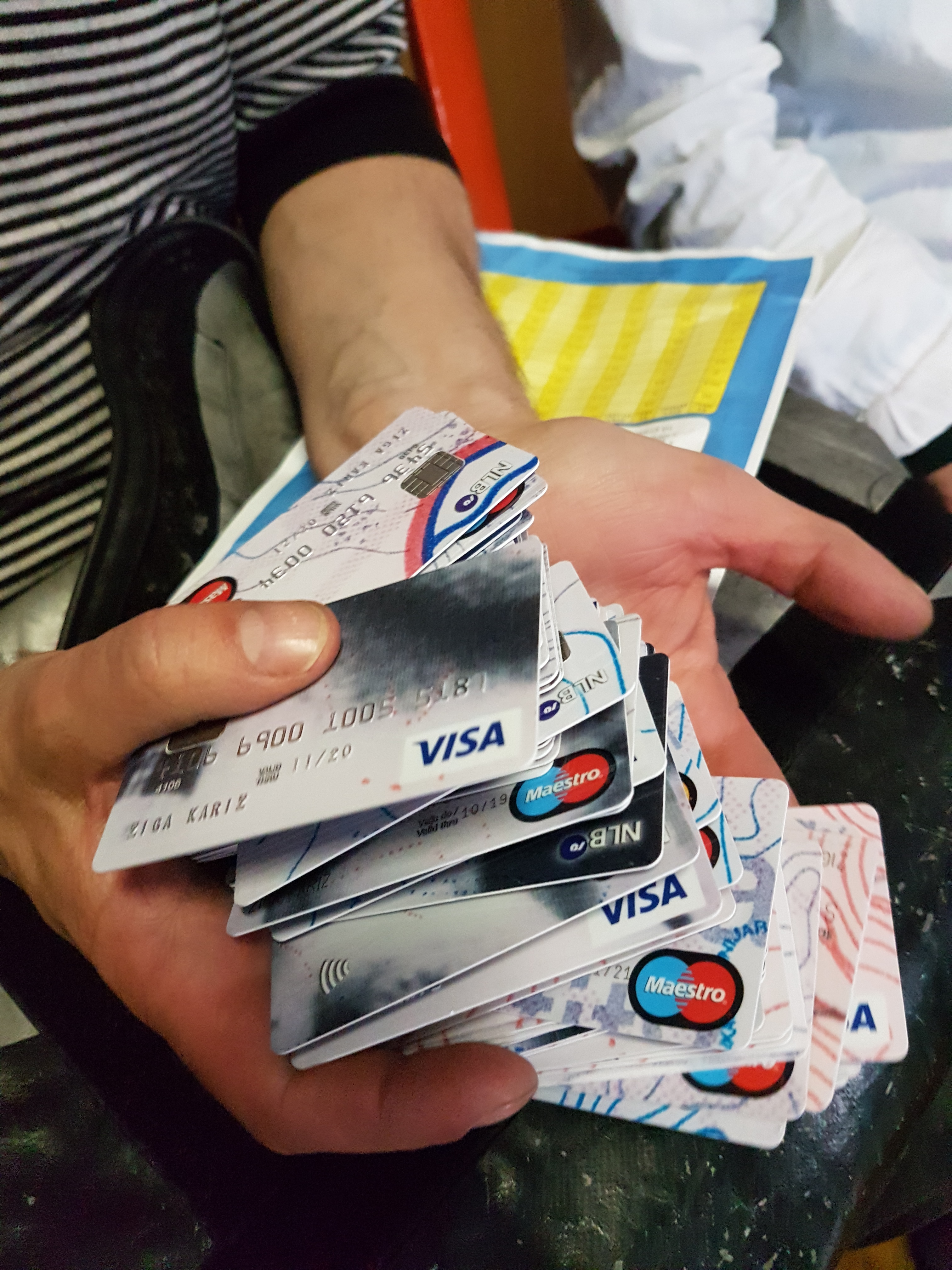
Janez Janša, Janez Janša and Janez Janša, All About You, 2016
Hi Janez Janša, Janez Janša and Janez Janša! The three of you applied for a new personalized Visa®, Maestro® and MasterCard® every week. How did you convince the bank to print a new card for you each time? Did you say it was an art work? Pretend you had lost the previous one and they had to send a new card again? Didn’t that annoy them?
JJ: There was no need to convince them to produce new cards for us over and over again since the personalized card service is an option offered by our bank. And we are bank’s customers… Nevertheless every single request was subjected to the scrutiny of bank’s employees who could decide to accept or deny the submitted image in accordance with the service’s guidelines.
JJ: We have never staged the loss of a bank card to obtain another. We used their online platform to submit the new image and then waited for their approval. Upon receiving a positive answer we proceeded with the order of another card and then comfortably waited at home for the delivery. Easy.
JJ: In fact banks often promote this service with slogan like “Find an artist in yourself and create unique card from your couch”. And that’s exactly what we did.
JJ: But we never told them it was about an artwork. You don’t necessarily need to tell your printing service about the nature of your print.
JJ: Afterwards all the pieces of the mosaic are also valid Bank Cards and that’s exactly how they understood them: in the way they are used to see them and to deal with them.
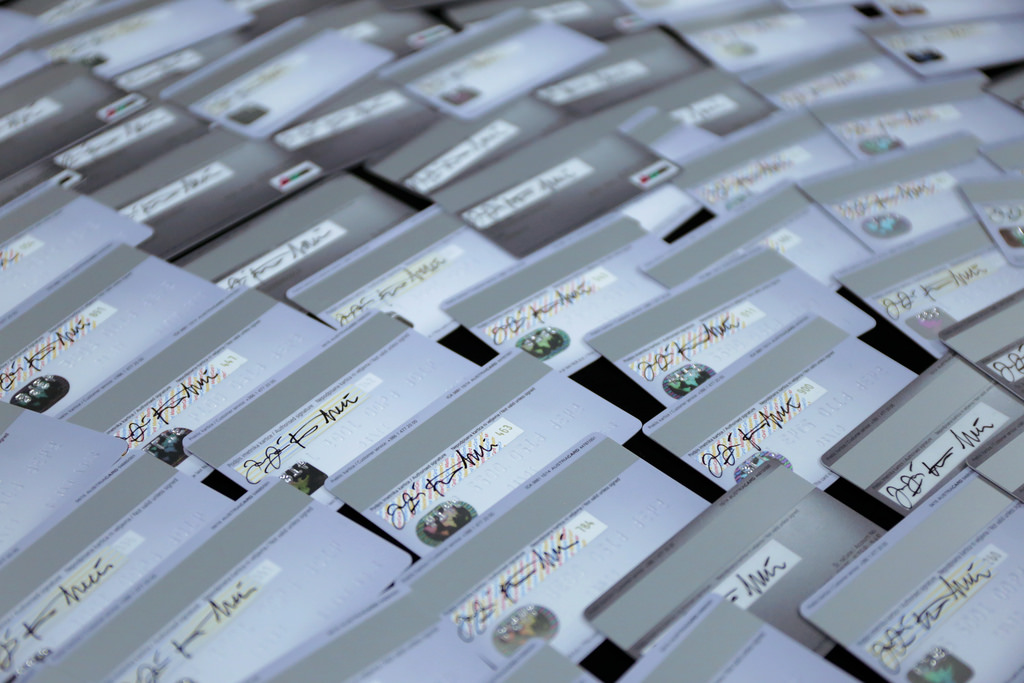
Janez Janša, Janez Janša and Janez Janša, All About You, making of, 2016
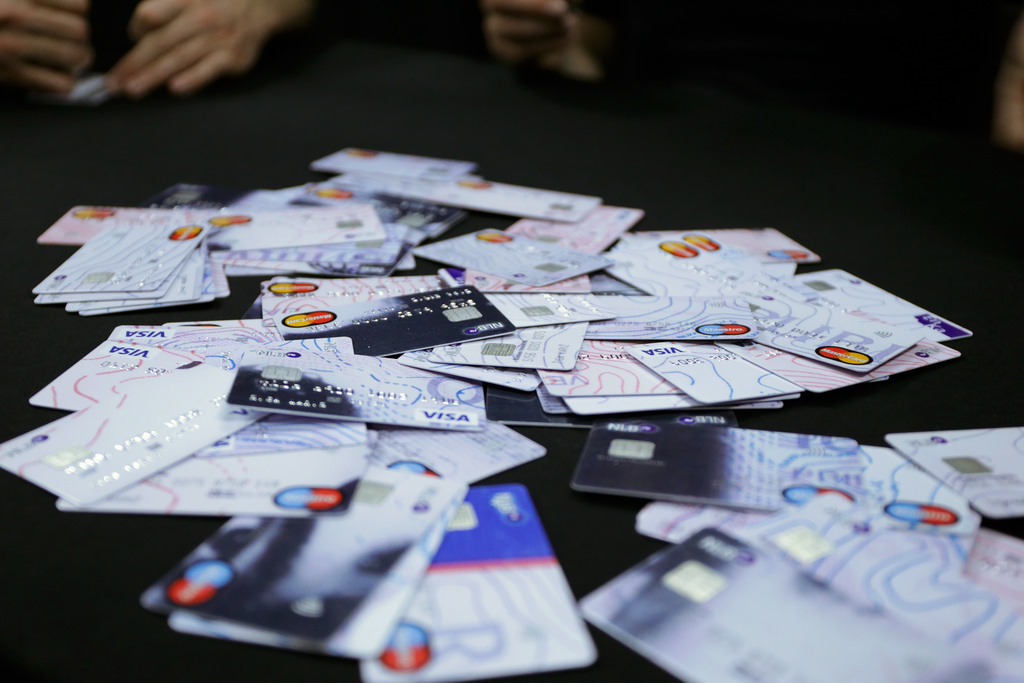
Janez Janša, Janez Janša and Janez Janša, All About You (detail), 2016. Photo: Katra Petriček/Aksioma
But maybe the bank saw your work as a great opportunity to advertise their services? Because it gives them visibility and because they play such a direct and material part of the performance. Was it ever a concern for you that your gesture would somehow be used by the bank to their own advantage?
JJ: I doubt the bank saw in our work an opportunity to advertise their services as this would imply they understood it was an artistic time-based relational performance. There should have been someone at their end capable of having a comprehensive supervision over the whole process, throughout 16 months, the time we spent on it. Instead, as we know, there were several bank’s employees scrutinizing our requests over time and I don’t believe they ever met all together around a table to compare and share all the “mosaic tiles” collected by each one of them to ultimately compose the puzzle and understand what was going on. And if they did, that might have been an excellent diversion to ease the boredom and predictability of a desk job.
JJ: By the way, if they saw that opportunity then they never really took advantage of it. It reminds me of the situation with Janez Janša, the controversial politician we took the name of back in 2007. He could have easily turned our gesture at his advantage but he never did it. If someone embarrasses you by being too supportive, too affirmative, a possible way to deal with it is to love that person back as vehemently as possible and see what happens. Instead the politician decided to go confrontational and play the “character assassination” card.
JJ: The risk of your work being used by corporations, politicians, etc. is something you have to be ready to take if you operate beyond the safe area of the cultural context.
JJ: Our work, especially the name change, has been often criticized in terms of making promotion both for politician Janša and for ourselves. But in fact the more we gained visibility, and supposedly promoted the politician, the less welcomed we were by him, his party and his people. Of course, MasterCard® is not Janez Janša but the risk is there and we consciously embrace it.
Janez Janša, Janez Janša and Janez Janša, All About You. Signing
Did each of you go through the same, individual and repeated process of asking for a card over and over again? Did your experiences and personal relationships with the bank employees differ?
JJ: Many people see us as a “collective” but mostly of the time, in the work we do together, we are “forced” to operate individually due to the nature of the work itself. For All About You each of us acted independently. After all we did the same for our “common” name change, for the affiliations to the conservative party SDS lead by Janez Janša, and for many other things we did in the past. It wasn’t possible to do otherwise. One cannot apply for a collective name change; neither can he order a personalized bank card on behalf of others.
JJ: We had personal email exchange with several bank employees, especially when a submitted image was rejected. We always asked what the reason for their negative answer was. Most of the time they referred to the bank’s image guidelines published online saying that the submitted image didn’t comply with it.
JJ: We always asked them to point out exactly what article of that document our image didn’t comply with and most of the time we got a precise answer. In their image guidelines, it is stated that the design chosen to create a personalized card must not contain (or refer to):
• Insulting and provocative images, graphics and other materials with religious, racist, hateful, violent or political messages in all forms;
Here our name appearing on the ID card has been understood as a “political” content. We then asked them where they see the difference between the name of the account holder and the very same name printed on the card as personalized design. They never answered that question.
• Photos, images or graphics, state or national symbols;
Our ID cards obviously contain state and national symbols. The graphic in itself is the graphic of a state document.
• Texts in a foreign language or foreign characters;
A Slovenian ID card is bilingual therefore English words (including the word “SEX” used there instead of “gender”) appear on it.
Sometimes at the end of the mail exchange bank’s employees changed their mind and granted us the permission to use the image previously rejected. But that didn’t happen very often. A more effective strategy proved to be applying again and again with the rejected image hoping the request will be received and processed by another, less loyal, or simply more inattentive, employee.
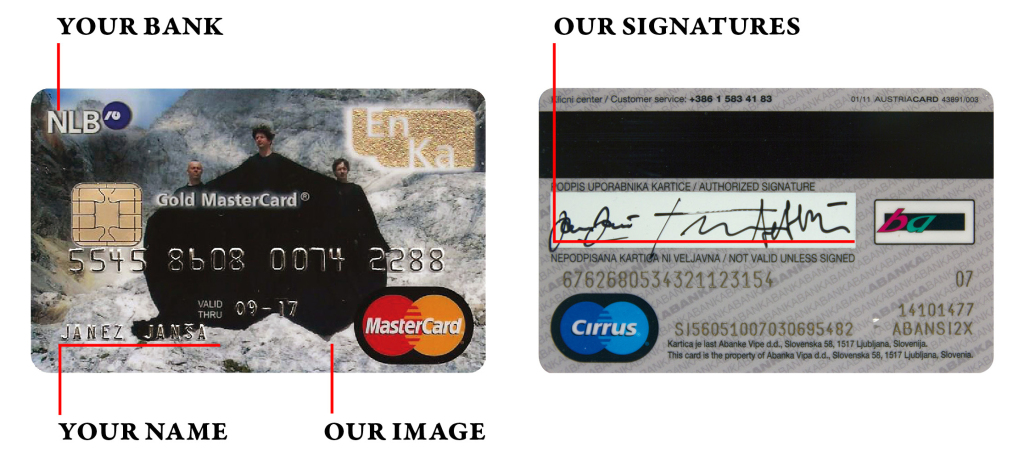
Janez Janša, Janez Janša and Janez Janša, Trust
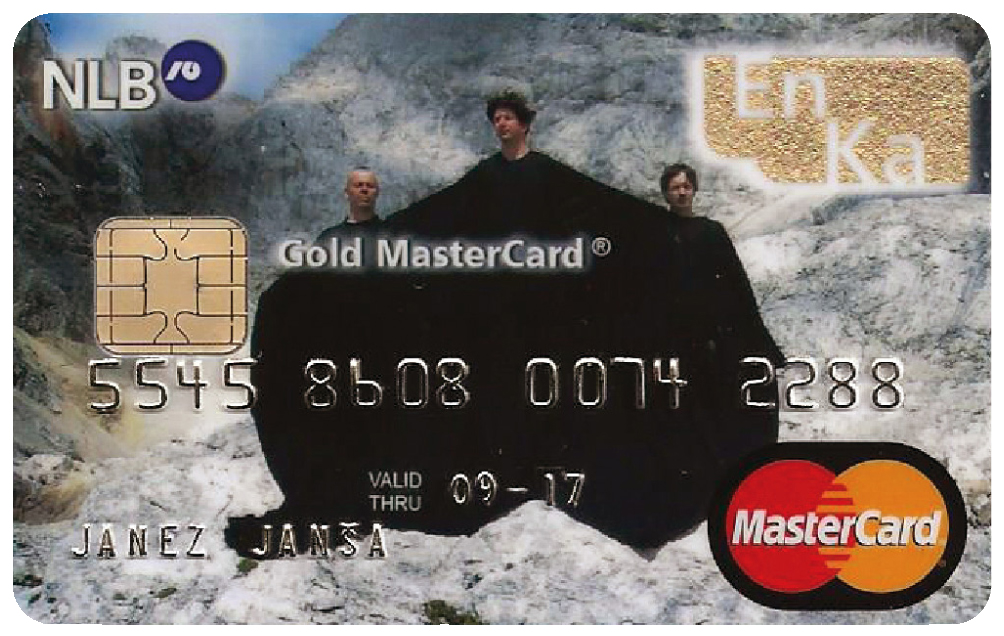
Janez Janša, Janez Janša and Janez Janša, Mt Triglav on Mt Triglav
Another of your work, Trust, similarly deals with credit cards. These two projects unashamedly blur art with money with identity…
JJ: What All About You and Trust have in common is the medium (personalized bank cards) and the “producer” of the artifact (our bank). But they are essentially two very different projects.
In Trust we invited people to approach their banks and to request a personalized card using the image of our action Mt Triglav on Mt Triglav. Then all three of us signed their cards in the signature strip in the reverse side of the card with a permanent black marker providing each “partner in crime” with the Certificate of Authenticity for that newly generated pocket-size artwork by Janez Janša, Janez Janša and Janez Janša.
JJ: To twist the situation a bit more we subsequently paired participants two by two in random fashion and then asked them to perform an ultimate gesture of trust: to switch cards among themselves and live that way for at least a week. To our big surprise all of them accepted the challenge. Some of them even felt the need to provide the other with his/her card’s PIN code.
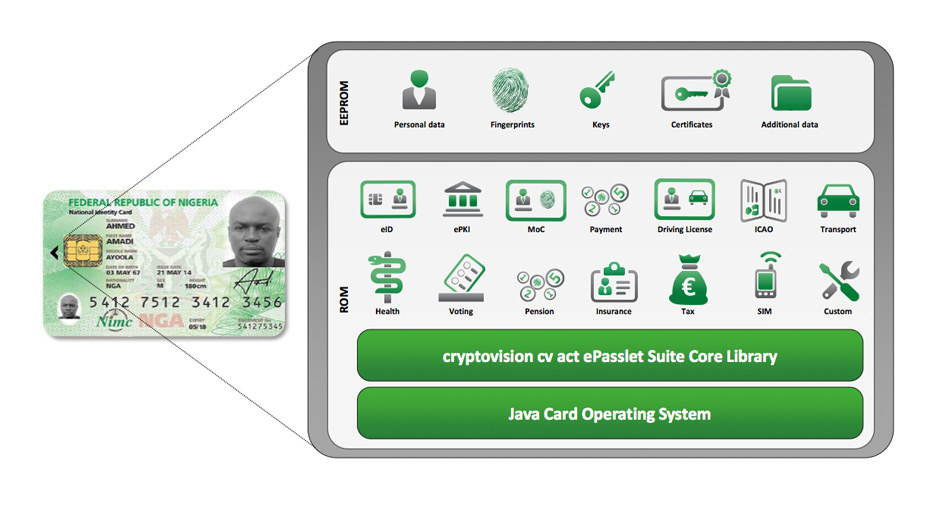
Nigerian National Identity Smart Card. Photo: MasterCard
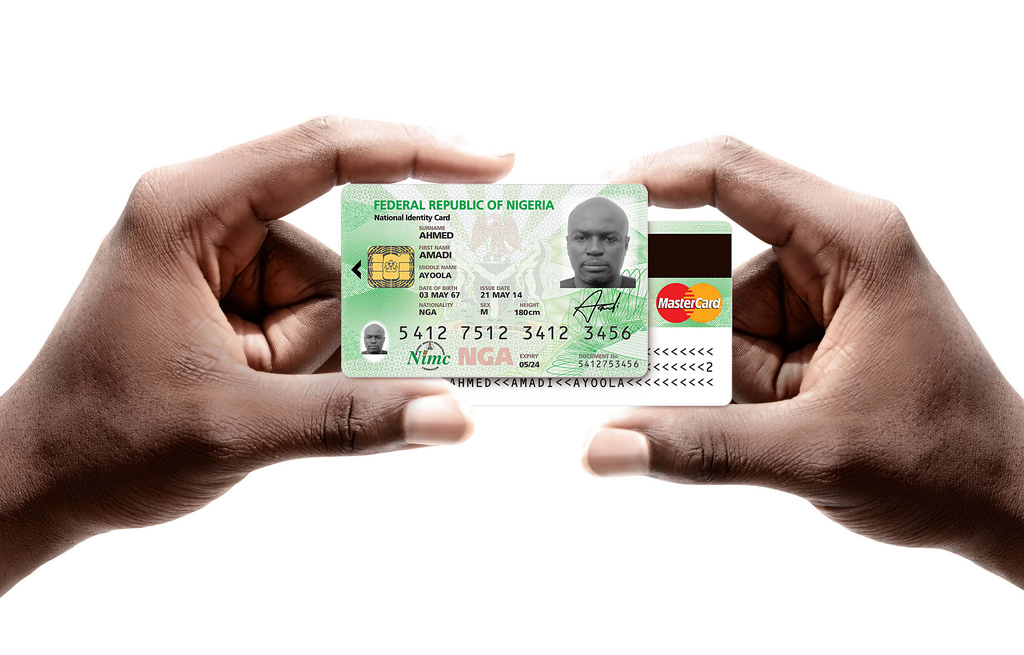
Nigerian National Identity Smart Card. Photo: MasterCard
Why do you feel that this is an issue worth exploring at the moment?
JJ: We have always been interested in identity-related issues, in the relation subject-state, subject-corporation and corporation-state. All About You covers all of these relations commenting on how identity is constructued nowadays. The spark went off in May 2013 while reading the news about the Nigerian National Identity Management Commission (NIMC) announcing the rollout of the National Identity Smart Card, a new multipurpose MasterCard-branded identification document that includes, among many other features, MasterCard’s prepaid payment technology. The enrollment process involved the recording of an individual’s demographic data and biometric data, which would provide the basis for a “National Identity Database.”
JJ: It’s very important to question techniques and technologies for gathering data, to understand the way they are used and by whom. What’s actually happening in many African countries is that private banks and corporations are offering governments to cover costs for the realization of centralized biometric population registers. To see that happening soon in Europe or at the global level it doesn’t seem to me a farfetched scenario.
JJ: BTW, have you noticed the form, the size and the material of ID cards nowadays are often identical to those of bank cards? States are adapting to formats introduced by corporations…
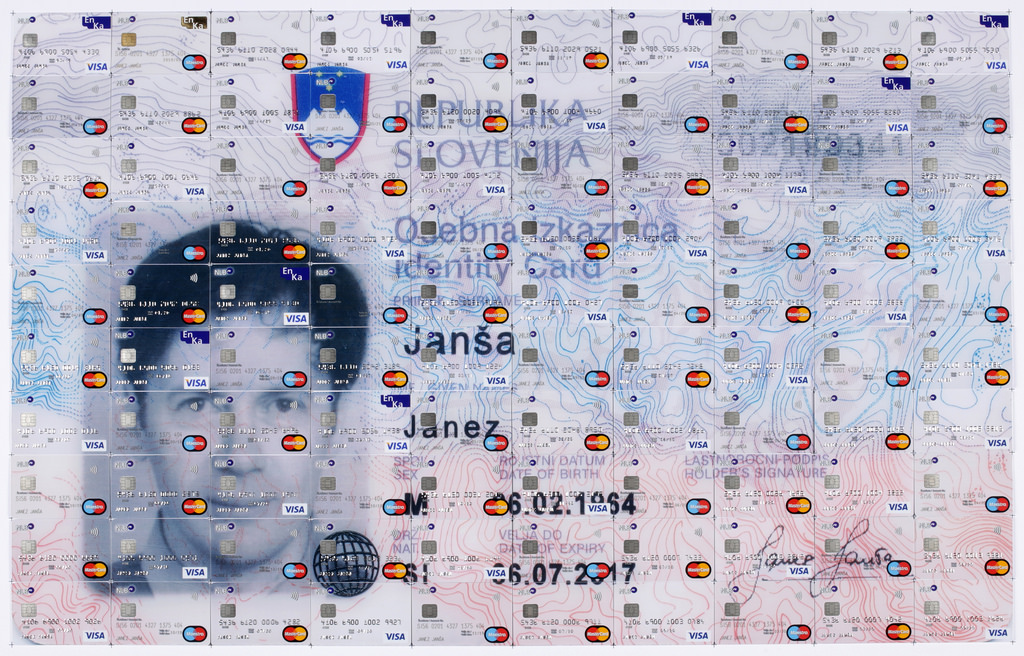
Janez Janša, Janez Janša and Janez Janša, All About You, 2016
How are you going to exhibit All About You? Is this going to be only a display of the cards or is there also some documentation of the whole process with videos, photos, etc?
JJ: All About You will be displayed as a framed triptych without any additional explanation of sort. We have documented and archived the whole production process including all the emails we exchanged with bank’s employees especially regarding images that have been rejected by them. We don’t think this kind of material can really add something relevant to the project. On the contrary, the risk would be to make it too didactic.
JJ: While explaining the piece to friends and fellow artists we often noticed they couldn’t really get that we got hundreds of personalized cards from our Bank over several months and that we used them to compose the blow-up image of our 3 ID cards. That’s why we decided to produce a short stop-motion video clip. But this video is not the piece in itself. It’s only a dissemination tool and as such it won’t be displayed in the exhibition.
Will you be inviting employees from the Nova Ljubljanska Banka to the opening of the show?
JJ: Yes, we will invite them. Without them All About You would never be done…
Thank you Janez Janša, Janez Janša and Janez Janša!
Janez Janša, Janez Janša, Janez Janša: All About You is exhibited until 8 July at the Kulturni center Tobačna 001 in Ljubljana, Slovenia.
Previously: My Name Is Janez Janša.
Related story: Biometric Capitalism.



